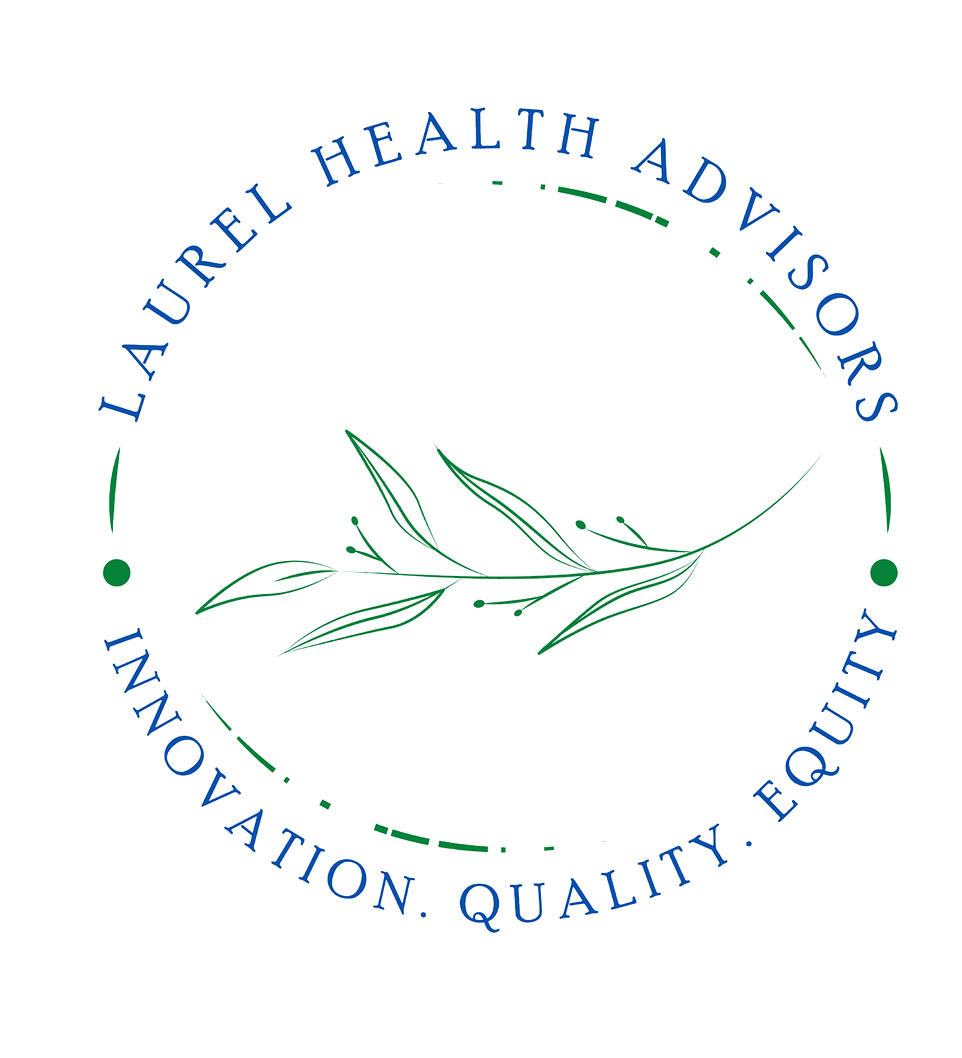
Our Expertise:
Innovation
Looking to build the healthcare of the future
Laurel Health Advisors provides data-driven insights on the present and future of healthcare. We have led countless projects in healthcare innovation as well as been involved with national and state-wide strategic planning sessions for health information exchanges across the United States. This team has also worked to secure regulations for meaningful use, interoperability, and data security - all while providing their clients with unparalleled service from an industry leader!
Equity
Ensuring that healthcare is accessible and equitable
Decades of experience in rural health and underserved populations make us uniquely qualified to understand health equity issues. We are committed to working with organizations that want to help reduce disparities, increase accessibility for healthcare services, and work toward a healthier future for all people - one that is equitable across socioeconomic backgrounds.
Quality
Championing excellence in every encounter
Laurel Health Advisors has decades of experience in developing and managing successful quality measurement programs, specifically for long-term care facilities, hospital settings, and outpatient locations. We know how to create a program based on accurate data so as to deliver effective health care with an emphasis on what benefits patients first.
Data and Real-Time Information
Empowering decision-making at the speed of need
Our team of experts has the skills necessary to help organizations find solutions when they need it most. We are proficient in mixed-methods research, statistical methodologies, and real-world evidence collection and analysis, which is what makes us so valuable for complex problems that require robust data-driven approaches.



Our Resume:
Download our full Corporate Capabilities statement here:
-
Surveys
Developed survey instruments for the US Department of Health and Human Services (HHS), eHealth Initiative, Disabled American Veterans, and the District of Columbia, among many others.
Focus groups & interviews
Designed protocols and facilitated over 150 focus groups for public and private clients; conducted over 1000 key informant interviews.
Administrative data
Expertise in collecting, managing, and analyzing claims, encounters, and clinical registry data to develop robust insights for organizations.
Data warehousing
Experienced in the development of data warehouses using cloud-based technologies (AWS Redshift), using ETL tools to transfer data, and using OLAP to create rich insights to guide research for public organizations, universities, and private enterprises.
-
White papers
Authored white papers for private clients (Oracle, IBM Watson Health), non-profit organizations (Centers for Telehealth and eHealth Law) and public clients (HHS, DoD) for both marketing and policy analysis.
Issue briefs
Developed issue briefs for public and private clients on topics such as telehealth fraud, opioid abuse, health disparities, maternal morbidity, and rural health.
Literature and environmental reviews
Established criteria and abstracted information for systematic literature reviews for HHS, DoD, and private clients such as IBM Watson Health.
-
Measure Development Lifecycle
Proficiency in clinical quality measure lifecycle from development to testing to endorsement. Established e-measures for primary, inpatient and post-acute care, including specific topics such as telehealth, women’s health, and contraception.
Use of Measurement Tools
Skilled in clinical quality language (CQL), the Measure Authoring Tool (MAT), the Quality Data Model, the BONNIE tool, and QRDA (I and III)
Public Reporting and Utilization of Quality Measures
Facilitated the creation of CMS Compare sites for Hospitals and Nursing Homes. Designed and disseminated report cards and dashboards to identify benchmarks and customize technical assistance.
Patient-Reported Outcome Performance Measures (PRO-PMs)
Contributed to the development of PRO-PMs across several clinical areas, including hypolipidemia, ALS, and small-cell carcinoma.
-
Strategic Planning
Established strategic plans for HHS, State of Oklahoma, District of Columbia, Electronic Healthcare Network Accreditation Commission (EHNAC), and advised private entities on creation of new business lines.
Thought Leadership
Spearheaded development of a comprehensive data dictionary for telehealth analysis, refinement and enhancement of prescription drug monitoring plans (PDMPs), guidelines to reduce adverse drug events and hospital-acquired infections, including opioid over-prescribing.
Regulation Writing
Oversaw development of Health Insurance Portability and Accountability Act (HIPAA) privacy and security rules and Meaningful Use regulations.
Policy Interpretation
Developed and presented syntheses of pending policy and regulatory provisions including Congressional bills, notices of proposed rulemaking, final rules, and Federal guidance.
Established strategic plans for HHS, State of Oklahoma, District of Columbia, Electronic Healthcare Network Accreditation Commission (EHNAC), and advised private entities on creation of new business lines.
Thought Leadership
Spearheaded the development of a comprehensive data dictionary for telehealth analysis, refinement, and enhancement of prescription drug monitoring plans (PDMPs), guidelines to reduce adverse drug events, and hospital-acquired infections, including opioid over-prescribing.
Regulation Writing
Oversaw development of Health Insurance Portability and Accountability Act (HIPAA) privacy and security rules and Meaningful Use regulations.
Policy Interpretation
Developed and presented syntheses of pending policy and regulatory provisions, including Congressional bills, notices of proposed rulemaking, final rules, and Federal guidance.
-
Proposal and Grant Writing
Authored numerous award-winning contract and grant proposals for procurements from Federal, state, local, and foundation clients
-
Advanced analytics
Experienced in numerous statistical and machine learning analytical methods using tools such as R, Python, Tableau, SAS, and Stata.
Data visualization
Expertise in developing visuals to transform data into meaningful insights using tools such as Seaborn, ggplot, Tableau, Adobe Illustrator
Experienced in numerous statistical and machine learning analytical methods using tools such as R, Python, Tableau, SAS, and Stata.
Current & Previous Clients
Other Projects:
Privacy and Security of Electronic Behavioral Health Information
Through a subcontract, Laurel Health Advisors supported The Office of the National Coordinator for Health Information Technology (ONC) to support the implementation of Jessie’s Law enacted under the Substance Use‑Disorder Prevention That Promotes Opioid Recovery and Treatment for Patients and Communities Act of 2018 (SUPPORT Act). The law requires The Secretary of Health and Human Services to develop and disseminate best practices for prominently displaying a patient’s history of an SUD, with their consent, in the medical record to prevent providers from inadvertently prescribing opioids and other addictive pain medication to patients with a history of an SUD without their knowledge and consent. Laurel Health conducted a comprehensive environmental scan to identify available tools, resources, opinions, or ideas that pertain to Jessie’s Law and its objectives. The team also interviewed twenty-four individuals representing key stakeholder groups: providers, legal and privacy experts, patients with lived experience, and experts in health information technology and data standards. The findings helped inform federal policymakers on opportunities and challenges related to the implementation of the law. In addition to detailed presentations to senior leaders at HHS, Laurel Health worked with the American Health Information Management Association (AHIMA) to produce two training videos for providers to support implementation and developed written content to help patients receiving care for substance use disorder understand federal laws protecting their data and how consenting to share data sharing is important for patient safety.
Integration of Behavioral Health Data into a Community Health Information Exchange
As a subcontractor, Laurel Health Advisors is supporting a regional health information exchange to facilitate the implementation of best practices to integrate sensitive health information to better support care coordination for high-cost, vulnerable members of the community. The project is comprised of three phases: (1) an assessment of the current health information technology infrastructure within the region and identification of opportunities to align with best practices; (2) delineating recommended activities, investments, and partnerships to enhance operations and facilitate broader partnerships with facilities that are protected under 42 CFR Part 2;(3) developing an onboarding and educational package that can be employed by the entity as it expands its footprint.
Establishing a Statewide Health Data Utility
Laurel Health Advisors participated in a project to inform the development of a statewide health data utility. The objective was to provide recommendations, guidance, and requirements to solicit a vendor to establish a system that integrates clinical and non-clinical data to support the electronic exchange of information to advance quality, efficiency, and population health. The project was informed by a comprehensive environmental scan, including interviews with over 20 stakeholders, including state employees, providers, professional membership organizations, and state contractors. The first phase of the project sought to identify existing sources of data, health information exchange activities underway, and alignment of state contractors with the Trusted Exchange Framework and Common Agreement (TEFCA). The findings informed the development of a health data utility plan tailored to support state goals while building upon the current infrastructure. Finally, Laurel Health Advisors led the development of a set of requirements for generating the health data utility.











